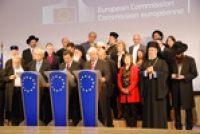
 Δημοσιεύτηκε: Ιούλιος 13. 2012 12:11
Δημοσιεύτηκε: Ιούλιος 13. 2012 12:11
On 12 July 2012, twenty-four religious leaders from all over Europe met for a three hour exchange and a press conference with the President of the European Commissions, Josė Manuel Barroso; along with Hermann van Rompuy, President of the European Council and Lázló Surjan, Vice-President of the European Parliament. This is the 8th year that the President of the European Commission has fiftinvited representatives from different religions as part of the “open, transparent and regular” dialogue according to Article 17(3) of the Lisbon Treaty. “Intergenerational Solidarity: Setting the Parameters for Tomorrow’s Society in Europe” was the theme of this year’s high-level Religious Leaders Meeting.
By 2050 fifty percent (50%) of all Europeans will be over the age of 50 and the proportion of those over the age of 80 is expected to more than triple. Youth unemployment has risen significantly and, due to the financial and economic crisis in some European countries, it has risen dramatically. It is of no surprise, therefore, that pressure on the so-called sandwich generation has increased.
Many of the religious leaders identified the participation of the European people, especially of the young people, in the political process as one of the key elements in responding to the present financial and economic crisis as well as to the demographic changes in European societies. "Democracy and, therefore, participatory justice is at the heart of the European project," Metropolitan Emmanual of France and President of the Conference of European Churches insisted. And Kristine Jansone, General Secretary of the Ecumenical Youth Council in Europe added: "Instead of looking at no future, young people are looking forward to an owned future." Rev. Dr Guy Liagre, General Secretary of the Conference of European Churches said: “It is cynical, if people speak of a “lost generation” in relation to today’s young people. According to the Christian understanding, no one can be lost and every person has an inherent human dignity. As Christians, we have to live up to this promise”.
In response to the demographic challenge, the religious leaders emphasised the need for support for intergenerational projects, which foster the mutual understanding and the mutual learning between the generations. They urged the European Union and its member states to develop family friendly policies, as the family in many cases has served as a safety net at a time of economic difficulties and the family is the nucleus, in which the intergenerational dialogue is experienced. "A family friendly policy includes, for instance, adequate minimum income schemes for families as well as flexible working hours," Metropolitan Emmanuel said. "Family life, however, varies from one part of Europe to another," Rev. Dr Guy Liagre, added. "We have to reckon today with very different forms of family life and they all need social protection. More and more people live alone, in single parent households or in partnerships."
In their speeches, President Barroso and President van Rompuy highlighted that solidarity and intergenerational dialogue cannot be prescribed by law or fostered only by certain programmes. Besides an institutional framework, there needs to be value-based interaction between people. And it is recognised that the churches and religions do play and important role in this regard.
Besides the CEC President Metropolitan Emmanuel of France and the General Secretary Rev. Dr Guy Liagre, CEC Member Churches were also represented in this meeting by: His Beatitude Anastasios of Tirana and All Albania, His Beatitude Chrysostomos II of Justiniana and All Cyprus, Metropolitan Athanasios (Church of Greece) Bishop Seppo Häkkinen (Church of Finland), General Secretary Kristine Jansone (Ecumnical Youth Council in Europe), Präses Anette Kurschus (Evangelical Church in Germany), Bishop Christopher Morgan (Church of England) and Archbishop Nifon of Targoviste (Romanian Orthodox Church).
Press Release No. 12/13
12 July 2012